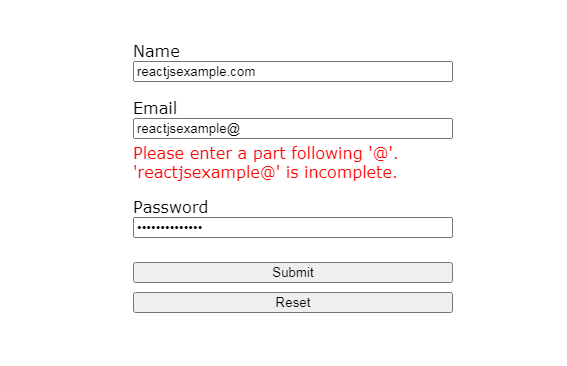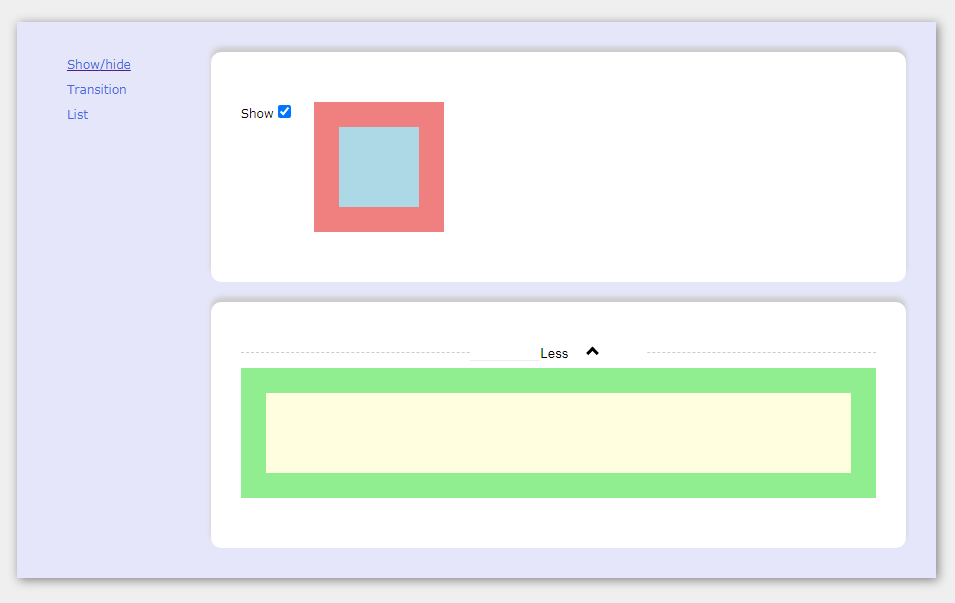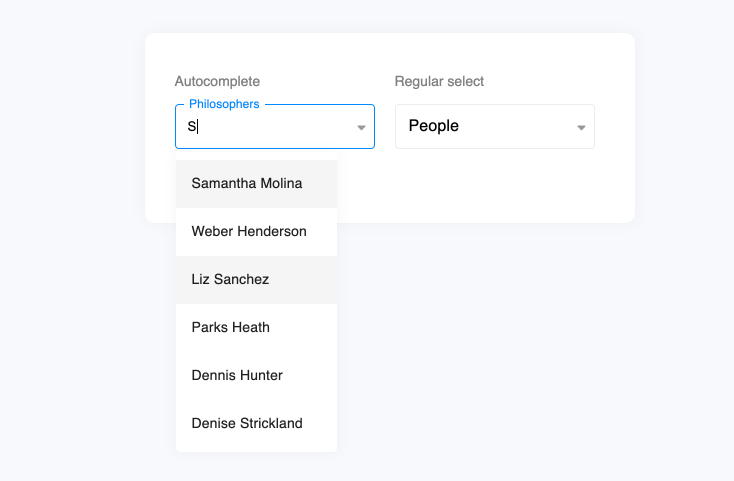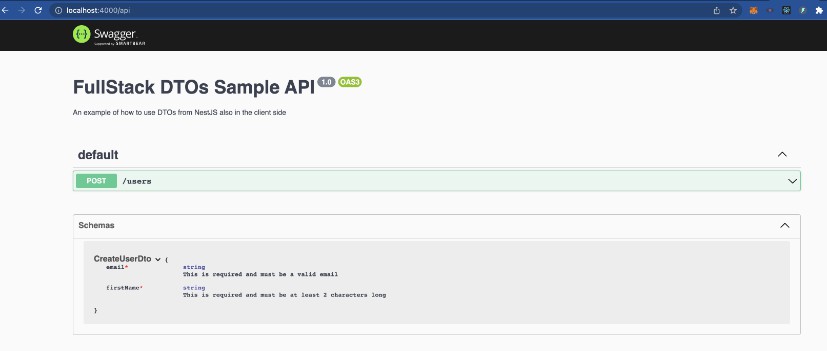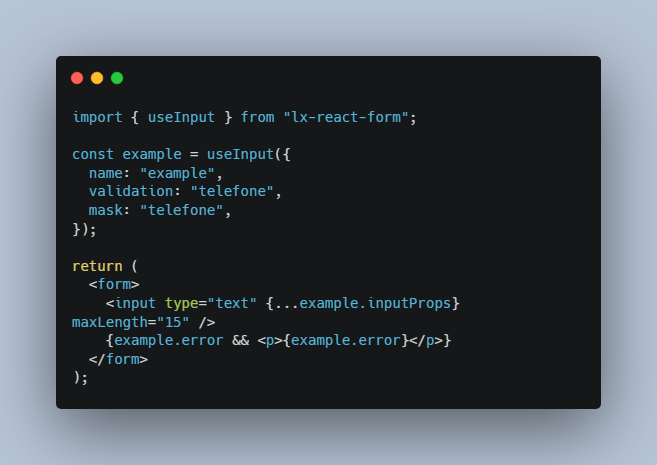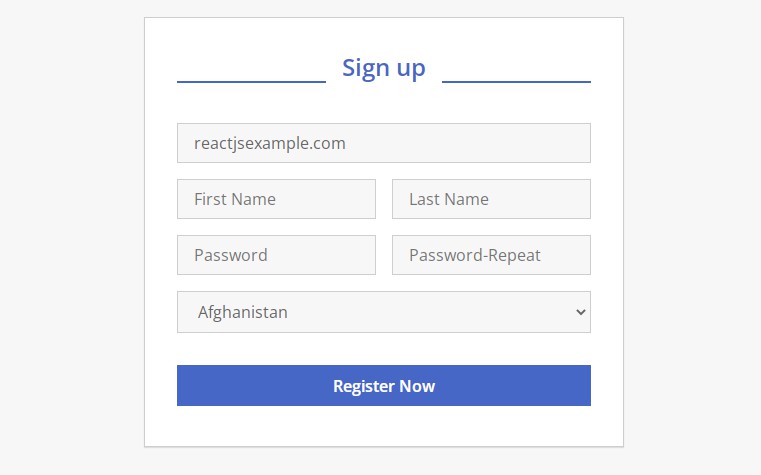REACT COOL FORM
React hooks for forms state, validation, and performance.
Milestone
- [x] Core features
- [x] Type definition
- [x] Support server-side rendering
- [x] CI/CD
- [ ] Documentation
- [ ] Examples
- [ ] Unit testing
- [ ] End to end testing
Getting Started
To use react-cool-form, you must use [email protected] or greater which includes hooks.
You can install this package via npm.
$ yarn add react-cool-form
# or
$ npm install --save react-cool-form
Here's the basic example of how does it works, full documentation will be provided soon. If you have any question, feel free to ask me.
import { useForm } from "react-cool-form";
const App = () => {
const { formRef, getState } = useForm({
// Provide the default values for our form state
defaultValues: { name: "", email: "", password: "" },
// The event only triggered when the form is valid
onSubmit: (values, actions) => {
console.log("onSubmit: ", values);
},
});
const errors = getState(
"errors",
// The second argument is the "watch" mode, it can be: { filterUntouchedErrors: true } | false
// Default as below, which helps you display an error until filed is blurred for better UX
{ filterUntouchedErrors: true }
);
return (
<form ref={formRef} noValidate>
<label>Name</label>
{/* Support built-in validation attributes */}
<input name="name" required />
{errors.name && <p>{errors.name}</p>}
<label>Email</label>
<input name="email" type="email" required />
{errors.email && <p>{errors.email}</p>}
<label>Password</label>
<input name="password" type="password" required minLength={8} />
{errors.password && <p>{errors.password}</p>}
<input type="reset" />
<input type="submit" />
</form>
);
};
The form state of the above example will look something like this:
{
"values": {
"name": "Welly",
"email": "[email protected]",
"password": "12345"
},
"touched": {
"name": true,
"email": true,
"password": true
},
"isValidating": false,
"isValid": false,
"errors": {
"password": "Please lengthen this text to 8 characters or more"
},
"isDirty": true,
"dirtyFields": {
"name": true,
"email": true,
"password": true
},
"isSubmitting": false,
"isSubmitted": false,
"submitCount": 1
}
Super easy right? The above example is just the tip of the iceberg. react-cool-form is a lightweight and powerful form library. you can understand the API by its type definition atm to see how it rocks ??.
import { FocusEvent, RefObject, SyntheticEvent } from "react";
type FormValues = Record<string, any>;
type DeepProps<V, T = any> = {
[K in keyof V]?: V[K] extends T ? T : DeepProps<V[K]>;
};
type Errors<V> = DeepProps<V>;
type FormState<V = FormValues> = Readonly<{
values: V;
touched: DeepProps<V, boolean>;
errors: Errors<V>;
isDirty: boolean;
dirtyFields: DeepProps<V, boolean>;
isValidating: boolean;
isValid: boolean;
isSubmitting: boolean;
isSubmitted: boolean;
submitCount: number;
}>;
type Options<V> = Omit<
Return<V>,
"formRef" | "validate" | "submit" | "controller"
>;
interface OnReset<V = FormValues> {
(
values: V,
options: Omit<Options<V>, "reset">,
event?: Event | SyntheticEvent<any>
): void;
}
interface OnSubmit<V = FormValues> {
(
values: V,
options: Options<V>,
event?: Event | SyntheticEvent<any>
): void | Promise<void>;
}
interface OnError<V = FormValues> {
(
errors: Errors<V>,
options: Options<V>,
event?: Event | SyntheticEvent<any>
): void;
}
interface Debug<V> {
(formState: FormState<V>): void;
}
interface FormValidator<V = FormValues> {
(values: V): Errors<V> | void | Promise<Errors<V> | void>;
}
interface FieldValidator<V = FormValues> {
(value: any, values: V): any | Promise<any>;
}
interface ValidateRef<V> {
(validate: FieldValidator<V>): (
field: HTMLInputElement | HTMLTextAreaElement | HTMLSelectElement | null
) => void;
}
interface GetState {
(
path: string | string[] | Record<string, string>,
watch?: { filterUntouchedErrors: boolean } | false
): any;
}
interface SetErrors<V> {
(
errors?: Errors<V> | ((previousErrors: Errors<V>) => Errors<V> | undefined)
): void;
}
interface SetFieldError {
(name: string, error?: any | ((previousError?: any) => any)): void;
}
type ValuesArg<V> = V | ((previousValues: V) => V);
interface SetValues<V> {
(
values: ValuesArg<V>,
options?: {
shouldValidate?: boolean;
touchedFields?: string[];
dirtyFields?: string[];
}
): void;
}
interface SetFieldValue {
(
name: string,
value: any | ((previousValue: any) => any),
options?: {
[k in "shouldValidate" | "shouldTouched" | "shouldDirty"]?: boolean;
}
): void;
}
interface ValidateForm<V> {
(): Promise<Errors<V>>;
}
interface ValidateField<V> {
(name: string): Promise<Errors<V>>;
}
interface Reset<V> {
(
values?: ValuesArg<V> | null,
exclude?: (keyof FormState<V>)[] | null,
event?: SyntheticEvent<any>
): void;
}
interface Submit<V> {
(event?: SyntheticEvent<any>): Promise<{ values?: V; errors?: Errors<V> }>;
}
interface Parse<E = any, R = any> {
(event: E): R;
}
interface Format<V = any, R = any> {
(value: V): R;
}
interface OnChange<E = any> {
(event: E, value?: any): void;
}
interface OnBlur {
(event: FocusEvent<any>): void;
}
interface Controller<V = FormValues, E = any> {
(
name: string,
options?: {
validate?: FieldValidator<V>;
value?: any;
defaultValue?: any;
parse?: Parse<E>;
format?: Format;
onChange?: OnChange<E>;
onBlur?: OnBlur;
}
):
| {
name: string;
value: any;
onChange: (event: E) => void;
onBlur: OnBlur;
}
| Record<string, unknown>;
}
interface Config<V = FormValues> {
defaultValues: V;
validate?: FormValidator<V>;
validateOnChange?: boolean;
validateOnBlur?: boolean;
ignoreFields?: string[];
onReset?: OnReset<V>;
onSubmit?: OnSubmit<V>;
onError?: OnError<V>;
debug?: Debug<V>;
}
interface Return<V = FormValues> {
formRef: RefObject<HTMLFormElement>;
validate: ValidateRef<V>;
getState: GetState;
setErrors: SetErrors<V>;
setFieldError: SetFieldError;
setValues: SetValues<V>;
setFieldValue: SetFieldValue;
validateForm: ValidateForm<V>;
validateField: ValidateField<V>;
reset: Reset<V>;
submit: Submit<V>;
controller: Controller<V>;
}
const useForm: <V extends FormValues = FormValues>(
config: Config<V>
) => Return<V>;
const get: (object: any, path: string, defaultValue?: unknown) => any;
const set: (
object: any,
path: string,
value: unknown,
immutable?: boolean
) => any;
